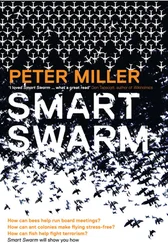“You mean they think? They have a language?”
I shrugged. “They’re not about to write you any sonnets. Do honeybees think? They’re about that smart. It’s not really a language, just a basic radio protocol. Like, on the penetration test, when they’re near the door, they’ll all quickly transmit to each other how well-placed they are, and then the one with the highest rating will say ‘OK, it’s me, I’ll open it.’”
“What if the frequency is jammed?”
I looked at Dmitri; this was his specialty.
“It’s military-strength technology,” the Russian said, “they’ll automatically cycle through multiple frequencies, you’d have to jam the whole spectrum.”
“But if it was? If they couldn’t communicate?”
Dmitri looked to me.
“I’m not sure,” I admitted. “We haven’t tested that. My suspicion is that on a penetration run you might have two or even three go down independently to open the door before the others realized what was going on. But probably not the whole swarm.”
Ortega nodded. “That’s acceptable. But let’s test them with their radios off. And what if someone else sends radio signals pretending to be part of the swarm? Like an animal mimicking birdsong.”
I was beginning to realize that Jorge Ortega was very intelligent indeed.
“It’s encrypted packet radio,” I said. “New keys are generated every time a swarm forms. Basically every mission. They’d have to break the encryption between launch and completion. And even if they did, they wouldn’t be able to do much with it. Much easier just to break into your control channel and signal them to abort.”
Ortega nodded, satisfied.
I realized something and opened my mouth to correct my second last sentence. The swarm network that drones used to talk to each other was like walkie-talkie communications directly between phones, with no cell tower involved. But while it was generally only used to fine-tune the drones’ actions while in flight, Sophie had designed it so that you could, at least theoretically, also use it to send control signals.
When the ramifications of that began to hit me, I shut my mouth.
“What is it?” Ortega asked, watching me hawklike.
“Just thinking about how long it would take to break the codes,” I lied. “Probably half an hour even with a supercomputer. Depends on the size of your keys.”
“Our network is secure enough,” Dmitri said sharply. “I can guarantee that.”
I didn’t really care. His packet radio network, the encrypted control channel, its whitelist that filtered out the kill switch and override code – all that would be rendered completely irrelevant if I could bypass it, by using the test harness to hack my way into the short-term, short-distance swarm network. Then I could knock them out with the kill switch.
Or seize control with the override.
“Hey,” I said, “these test drones, they’re not armed, right? Because if we send out a silenced swarm without even simulation testing, I mean, it’ll probably be fine, but technically we can’t be absolutely sure what they’ll do -“
This wasn’t really true, but I didn’t want them wondering why I was asking.
“Of course they’re armed,” Dmitri said absently. “In case this facility is attacked. But don’t worry. They’re hardware safetied. Even if they run amok they won’t blow up.”
“Good,” I said. “Glad to hear it.”
But I was thinking: Wanna bet?
Ortega, Dana, and his dozen bodyguards left the next day, after the radios-off test, which went better than I had expected; the swarm sent only two drones to switch off the light, and the other half swooped through the soccer tunnel sequentially rather than all at once. It creeped me out to watch them setting their own courses and making decisions with apparent intelligence. I knew it was an illusion, they were no smarter than ants or bees, but I couldn’t help but wonder what would happen in another decade or two, when their descendants became as smart as rats. It brought to mind science fiction tales of robot armageddons and deals with AI demons.
Those speculative worries helped displace my fear of the here and now, but only a little. I had been through more gut-twisting terror in the last few weeks than I had ever expected to face in a lifetime – the Colombian jungle, the Haitian pirate attack, my abduction – and had maybe gotten a little better at handling it; but those situations had been forced on me, I had had no choice but to react. There in Ortega’s compound I had the option to do nothing, and stay apparently safe.
It was so tempting to do nothing, or at least nothing so precipitous. When in doubt, don’t , whispered the soft and cowardly voice of reason. Just wait one more day. Maybe everything will change tomorrow. Maybe you won’t have to do anything.
But late that night I sat in my dorm-room cell, staring intently at my laptop, cycling through my illicitly downloaded aerial photos of this territory, plotting my escape. Just in case, I told myself. It was always best to be prepared.
It was thirty kilometres from the compound gate to the edge of the vast fenced area around us. Military territory, according to Dmitri. The one road cut straight across the wild, cactus-strewn semidesert except where it bent around a steep ridge. There were buildings, presumably guardhouses, where it met the fence.
I was all too aware that the plan fermenting in my mind was utterly insane. Ortega had increased security. It was me alone against dozens of armed and trained men, maybe a hundred if you included those at the second gate. I didn’t even want to count the number of ways in which things could go terribly wrong.
But then, things had gone terribly wrong already, and would inevitably get worse yet. Even if I quailed and did nothing, my life was not exactly on course for an extended span of years. I knew the walls of my gilded cage would close in on me soon enough. There was no sense in jumping into definite suicide, but it wouldn’t hurt to be ready. Just in case I needed it. Just in case I woke up one day feeling brave and crazy.
It took me six hours to write the program that might save both myself and the leaders of the Western world. The plan was simple enough. I would slip out and arm the drones’ explosive payloads, seize control of them, and use them to mount a sneak attack on up the compound gate. In the subsequent confusion I would steal a car and drive away like a bat out of hell on speed. The remaining drones would clear my road to Mexico City and safety. From there I would somehow warn the world.
It was a desperate and unlikely plan, and like most such, it did not long survive contact with reality.
I did not intend to escape when I picked my lock and slipped out from my bedroom late the next night. My plan was only to sneak down to the drones, open them, and see if I could arm the explosives. Part of me hoped it would be impossible. Then I would have no choice but to spend the rest of my life as one of Ortega’s pet engineers, working feverishly to prove my continued usefulness, dreading the day I became surplus to requirements.
The compound was eerily silent. I made it to the server room, liberated its toolbox, and made my way down the former academy’s barren halls to the stairway that led to the roof. The nights here were cold, and I shivered as I emerged into the open air, where air-conditioning ducts extruded like metal fungi from the gravelled roof.
I winced as I walked; socks and gravel were a painful combination. Above me a half-moon glittered brilliantly amid countless stars. The drones lay in a neat row beneath the tarpaulin that protected them from rain and prying satellite eyes, near the giant’s crossbow that was their launcher. The catch-net had been rolled up, and the control hut was locked.
Читать дальше












